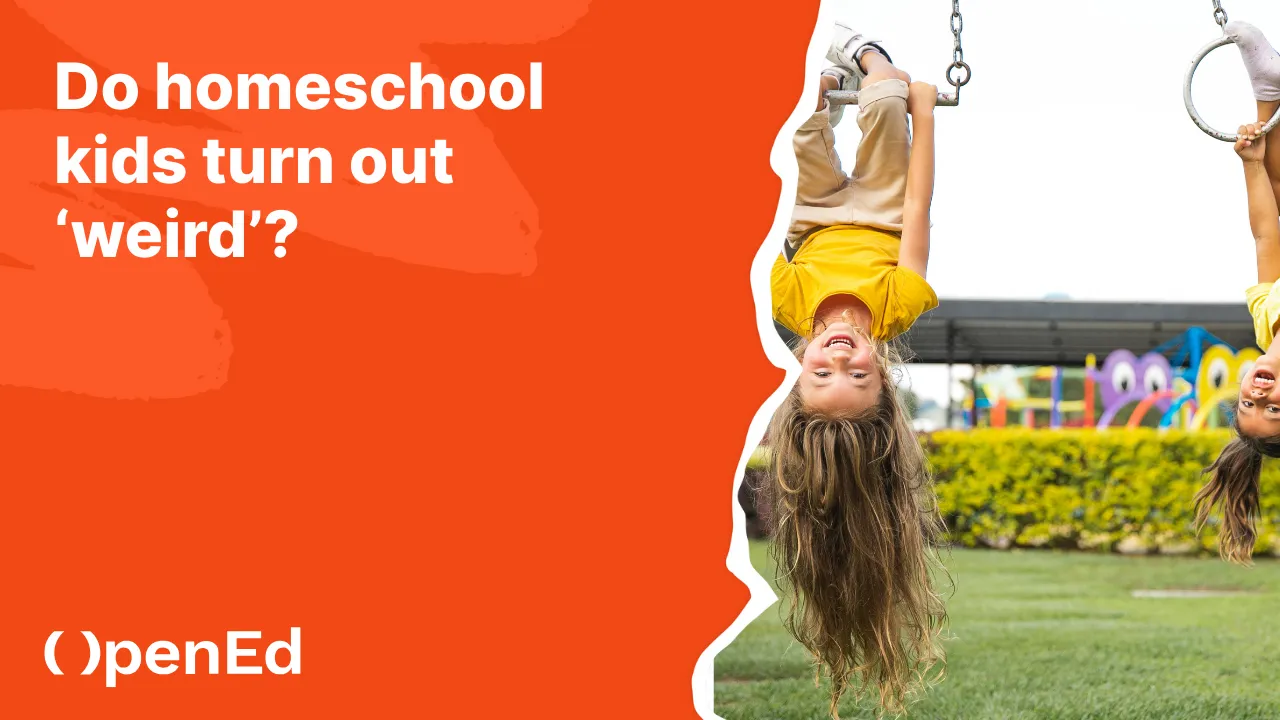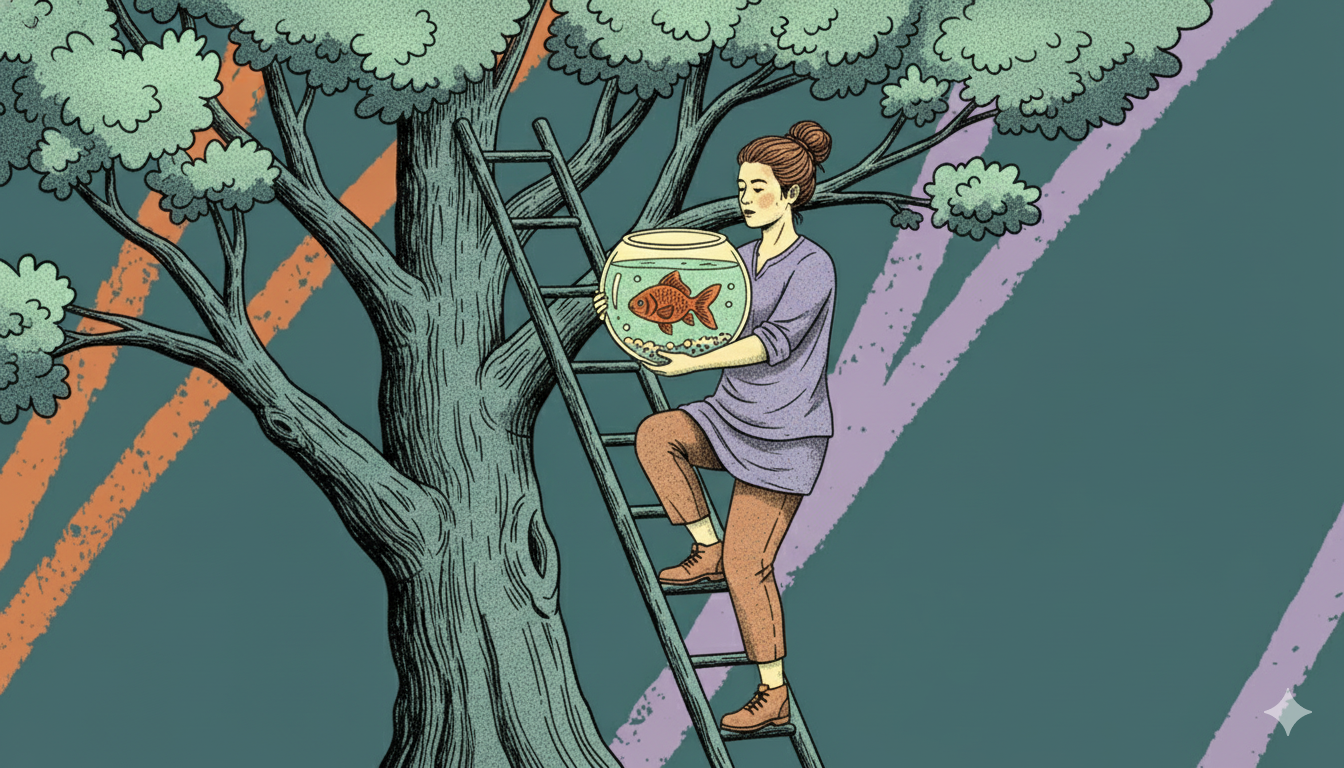
The Homeschool Socialization Question (Let's Get Weird)
The Homeschool Socialization Question (Let's Get Weird)
The Homeschool Socialization Question (Let's Get Weird)
Let’s talk about the question.
The one that stops conversations at family gatherings, raises eyebrows from neighbors, and haunts your parental fears - whispered, pointed, and deeply lodged in the heart of anyone considering an alternative education path:
"But what about socialization?"
We’re afraid of raising “weird” kids. Awkward kids. Kids who can’t navigate the world.
As Kris Bales, the voice behind the satirically-named Weird, Unsocialized Homeschoolers blog, admits, “We homeschooling families get tired of the socialization question… Of course, they’re socialized! No, they’re not weird. But sometimes we secretly worry that maybe they are.”
And while that question still lingers, something is changing. More families, educators, and even policymakers now understand that homeschooling doesn’t mean isolation. With thriving co-ops, hybrid programs, and platforms like OpenEd making a rich mix of academic and social opportunities accessible to more families, the “weird homeschooler” stereotype is starting to lose its grip.
Still, in the face of this very real anxiety, many parents hold onto the familiarity of the one seeming constant in a world that has changed radically in almost every other way: the American school system.
Never mind the fact that this system - the one we’ve long trusted to teach kids how to be “normal” - might actually be one of the most artificial social environments they will ever experience. It’s a place of age-segregated classrooms, bells timed at 50-minute intervals, and social hierarchies that evaporate the moment you walk out with a diploma.
What we’ve called “normal” for decades is overdue for a rethink. It’s time to reimagine what healthy socialization looks like. Families are finding that a more open, flexible model of education builds confidence, connection, and competence in ways the old system never could.
As proudly weird entrepreneur Matt Barnes observed on the OpenEd podcast, “when normal is broken, weird wins.”
Is the "Normal" School Environment Actually Healthy?
Before asking how kids get socialized outside of school, let’s take a look at what happens inside it - starting with a premise that seems absurd in any other context: age segregation.
Your job isn't like that. Your neighborhood isn't like that. The world isn't like that. Yet, this is the structure in which kids spend 15,000 hours of their most formative years.
T.K. Coleman, an educator and co-host of the popular Minimalists Podcast, notes how this creates a handicap:
“You never want your children to be the kind of people who only feel comfortable around their own age,” he warns. After years in an age-segregated system, new graduates are often hit with a wave of depression when they enter the real world.
Why?
“Because they have to move somewhere where they don't know anybody and they no longer have the luxury of an artificial neighborhood, an artificial campus where everyone is your age,” Coleman says.
In contrast, children with more agency in their education develop richer social skills precisely because their world isn't artificially constrained. They learn to interact with people of all ages in real-world contexts—by joining community projects, participating in mixed-age learning co-ops, and engaging with adult mentors in their areas of interest.
Redefining Social Skills: What Are We Really Worried About?
In fairness, the fear of the "weird" homeschooler isn’t always about a lack of social contact altogether. It’s about a perceived lack of conformity. But conforming to a broken model isn't a desirable outcome. The goal should be to raise confident, resilient, and authentic individuals.
The quiet part, the part no one says out loud, is that this focus on conformity was always the point. As Tuttle Twins author Connor Boyack points out, the architects of the American education system were explicit about their goals. William Torey Harris, the commissioner of education under four U.S. Presidents, admitted the state's primary goal was "the subsumption of the individual."
Torey didn't mince words:
“Ninety-nine [students] out of a hundred are automata, careful to walk in prescribed paths, careful to follow the prescribed custom. This is not an accident but the result of substantial education, which, scientifically defined, is the subsumption of the individual.”
We may need a dictionary for this one…
- Automaton (n.): a machine or device that runs by itself with very little direct human control.
- Subsume (v.): to place one thing under another or absorb one thing into something else.
And remember, that was the stated goal. So when people ask if your homeschooled kids will be weird, the real question is: weird compared to what? An automaton? If so, maybe "weird" is exactly what we need.
Hannah Frankman summarizes a critical distinction which she credits to Matt Bateman - the difference between what is common and what is normal:
"There are lots of things that we think are normal behaviors for children that are actually just common, but maladapted. The moody adolescent... it's not actually normal (i.e., healthy) for an adolescent to be moody all the time. It's common... because of the environmental inputs and stimuli that they're exposed to. They're forced to sit in school all day, they're not given any independence and agency... and because of that, they feel frustrated."
When we apply this framework, we see that many of the common negative experiences in schools are anything but normal and healthy.
Take bullying. A 2022 survey showed 1 in 5 students reported being bullied at school. Every year brings new anti-bullying campaigns, new policies, and new interventions. Yet at some level, bullying is inevitable - even ‘normal’ - within the structure we've created.
Grace Smith, writing for Frankman’s Renegade Educator site, notes, "When twenty-five hormonal teens spend eight hours together in a classroom, bullying will happen."
This experience is so widespread that some treat it as a rite of passage. Common? Yes. But it isn't normal.
In contrast, freedom from constant peer pressure allows homeschooled kids to develop a deeper, more resilient confidence. Isaac Morehouse, CEO of OpenEd, calls this “The Fleetwood Mac Effect”.
“Someone in high school who’s really into Fleetwood Mac… That’s just the weird kid,” he says. “You get to college, that is suddenly the coolest thing ever. You develop this identity as somebody who likes something that’s different from everyone else.”
An open, flexible education allows a child to cultivate that unique identity from the start - turning what might have been labeled “weird” in a conformist setting into a celebrated strength in the real world.
What Homeschool Socialization Actually Looks Like
If the schoolyard isn’t the ideal social incubator, then what is?
In the ideal scenario, you find ways to replace the artificial bubble of school with the real world - not just another bubble recreated at home. Chances are, you’re already doing this.
As Bales notes in her post What About Socialization?, “Most homeschooled children don’t live in a bubble. They’re out in the world playing with kids in their neighborhoods, going to scouts or church, and playing sports.”
This kind of organic, varied interaction produces a social education that’s more dynamic, authentic, and frankly, more useful for adult life. And increasingly, it’s also more connected. An article from Recess.gg explains, “online communities are revolutionizing how homeschooled children build meaningful friendships and develop essential social skills, challenging everything we thought we knew about social development.”
These platforms don’t replace in-person friendships; they expand what connection means - helping kids, especially in rural or isolated areas, “find their people,” practice collaboration, and build confidence that translates powerfully to real-world interactions.
That real-world orientation is what makes homeschool socialization so powerful. Instead of preparing kids to “get through” a cafeteria hierarchy, it equips them for life. One parent on a homeschool Reddit reframed the entire socialization question with a simple benchmark - what they called the “Real-World Socialization Test.”
Forget popularity contests. The question isn’t whether your child is “cool,” but whether they’re becoming a competent, well-adjusted adult:
“Can your child conduct themselves politely in public? Be polite to strangers, friends and family? Call to schedule an appointment, or order something, or work out a customer service issue? Hold a conversation with an adult while being friendly, communicative, and respectful?”
Those are the skills that matter. And in homeschooling, they’re practiced in daily life, side-by-side with parents, siblings, mentors, and community members.
Still, even parents who know all this sometimes wrestle with the quiet question Kris Bales explores in her post What If My Homeschooled Kid Really Is Weird?: what if it’s not just a stereotype - what if my kid really is different?
Bales’ advice is both comforting and practical: don’t let someone else define “normal,” but do look for ways to broaden your child’s world. That might mean joining a local club, signing up for a co-op, participating in team sports, or finding interest-based online groups where your child can discover peers who “get” them.
Friendship itself also takes on a different texture. Instead of being formed by simple proximity - same class, same hallway—homeschool friendships often grow out of shared passions: robotics clubs, theater troupes, sports teams, co-ops, or online collaborations. This means fewer superficial acquaintances and more meaningful connections. Or, as another parent on Reddit put it, kids “socialize and interact better over common grounds, not by being forced upon each other just because they all fall in a window of two birthday cut-off dates.”
The Open Education Approach: Socialization by Design, Not by Default
Understanding that socialization comes in many forms is only the first step. The next is realizing that you, as the parent, can be the confident architect of your child’s social world. An open education makes it possible to create a social ecosystem that is just as personalized as your child's academic journey.
For families who want the structure of a classroom without the drawbacks of a one-size-fits-all system, an open education model provides the perfect solution. Your child can benefit from the deep, interest-based learning of homeschooling while also enrolling in specific, in-person classes - like art, robotics, or a team sport - either at their local public school or in the community.
The goal isn’t to replicate the sheer volume of daily interaction found in a traditional school, but to build a rich, diverse, and healthy social life. This includes:
- Joining a co-op: Regular meetups with other homeschooling families for classes and projects.
- Pursuing passions: Enrolling in sports, arts, or STEM clubs where friendships form around shared interests.
- Engaging the community: Volunteering, participating in library programs, and getting involved in local events.
- Nurturing deep friendships: Prioritizing consistent, relaxed time with a few close friends, allowing strong bonds to form naturally.
This gives you ultimate control. You can choose positive, enriching peer environments by design, rather than accepting a mixed bag by default. It's socialization on your terms.
For too long, the socialization debate has pitted a flawed, industrial-era model against a misunderstood and often caricatured alternative. As Bales wryly lampoons in her satirical post Top 5 Ways to Ensure That Your Homeschooled Kid Is Weird and Unsocialized, you’d have to actively “quit letting them have friends,” “toss out all the computers,” and stop taking them to sports or co-op activities to create the caricature people fear. Her humor lays bare just how disconnected these stereotypes are from the vibrant, community-rich reality of homeschooling.
The question should never be if a child will be socialized, but how.
Will they be conditioned to conform to a temporary and artificial peer group? Or will they be prepared for a multi-generational world where confidence, character, and authentic connection are what truly matter? Open education cultivates resilience, adaptability, and a more profound and practical set of social skills. It frees children to become who they are, not who the system pressures them to be.
Subscribe to The OpenEd Daily
Join 17,000+ families receiving curated content to support personalized learning, every school day.
.webp)
.avif)




